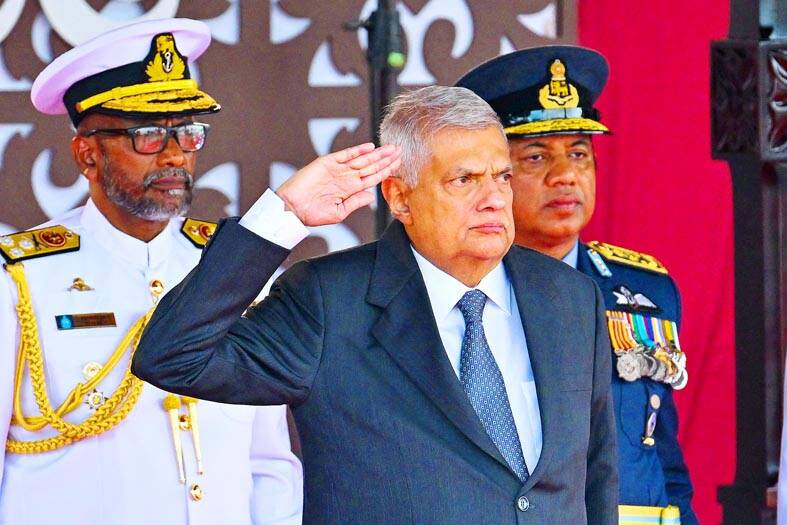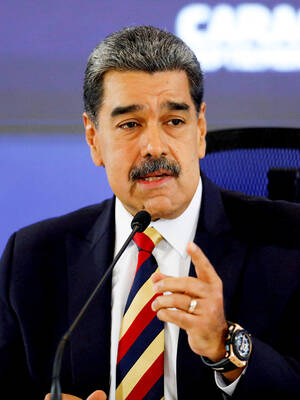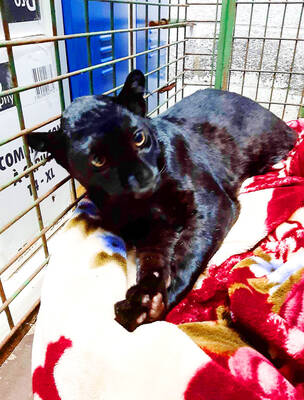Sri Lanka’s president is to arrive in India tomorrow for his first visit to the regional powerhouse, with concerns mounting in New Delhi over China’s increasing influence in the strategically placed, but financially bankrupt island.
New Sri Lankan leaders usually travel to India within a few weeks of taking office, but Sri Lankan President Ranil Wickremesinghe’s trip comes exactly a year after he took office following the toppling of his predecessor at the height of an unprecedented economic crisis.
As Sri Lanka drifted toward chaos with daily street protests over shortages of food, fuel and medicines, India poured in nearly US$4 billion in aid to restore supplies and stabilize the nation.

Photo: AFP
The loans and credit lines were granted despite Sri Lanka defaulting on its US$46 billion foreign debt and losing access to international financial markets.
“Without India’s help Sri Lanka could have degenerated into anarchy,” political commentator Victor Ivan said. “The president will not only have to show gratitude, but reassure that we will not do anything to hurt them. At the same time, Sri Lanka can’t drop China because they are also a very important economic partner.”
China is Sri Lanka’s biggest bilateral creditor and a Chinese firm acquired a 99-year lease on the southern port of Hambantota after Colombo was unable to repay a huge loan from Beijing to build it.
A US$1.4 billion land reclamation project next to Colombo port — the biggest-ever foreign investment in Sri Lanka — has raised Indian fears that Beijing could use it as a listening post. Initially some of it was to have been Chinese sovereign territory.
Sri Lanka lies halfway along the main international shipping route between Europe and East Asia, with Colombo and Hambantota the only deep sea ports between Dubai, United Arab Emirates, and Singapore.
New Delhi sees the region as its backyard and officials have been alarmed by Beijing’s activities.
As part of its Belt and Road Initiative, China has also struck other infrastructure deals with nations around the Indian Ocean, including the Maldives, Bangladesh and Djibouti, where it has a military base.
New Delhi raised concerns when a Chinese research vessel, the Yuan Wang 5, sought permission to dock at Hambantota in August last year.
The port call by what India describes as a spy ship went ahead. Sri Lanka responded by asking China not to carry out any “scientific research” while in Sri Lankan waters.
Local political columnist Kusal Perera called the Yuan Wang 5 spat an “aberration.”
“One such incident will not decide the fate of the entire relationship with India,” Perera said, adding that Indian businesses were also seeking to expand their presence in Sri Lanka.
Wickremesinghe sought to address India’s fears during a visit to France last month, dismissing speculation about Chinese military bases in Sri Lanka.
“No, we have no military agreements with China,” he told the France24 TV network. “There won’t be any military agreements. I don’t think China enters into one. We are a neutral country, but we also emphasize on the fact that we cannot allow Sri Lanka to be used as a base for any threats against India.”
Wickremesinghe would be the fourth Sri Lankan president to be hosted by Indian Prime Minister Narendra Modi.
He was elected by parliament to serve the remaining two-and-a-half years in the term of former Sri Lanka president Gotabaya Rajapaksa, who stepped down following protests over mismanagement of the economy, but the Indian establishment has often viewed six-time prime minister Wickremesinghe’s pro-Western United National Party with suspicion.
“Debt restructuring will be on the agenda along with connectivity,” a senior Indian diplomatic source said, adding that New Delhi would be keen to speed up infrastructure projects hit by bureaucratic delays.
Sri Lanka requires agreement from all its creditors, including India and China, on debt restructuring.
Colombo has proposed haircuts of up to 30 percent and a repayment freeze extending to nine years.
The second tranche of US$330 million out of a US$2.9 billion IMF bailout is due in September — subject to Colombo securing a deal with its lenders.
Wickremesinghe is due to travel to China for the first time as president in October.

VENEZUELAN ACTION: Marco Rubio said that previous US interdiction efforts have not stemmed the flow of illicit drugs into the US and that ‘blowing them up’ would US President Donald Trump on Wednesday justified a lethal military strike that his administration said was carried out a day earlier against a Venezuelan gang as a necessary effort by the US to send a message to Latin American cartels. Asked why the military did not instead interdict the vessel and capture those on board, Trump said that the operation would cause drug smugglers to think twice about trying to move drugs into the US. “There was massive amounts of drugs coming into our country to kill a lot of people and everybody fully understands that,” Trump said while hosting Polish President

A French couple kept Louise, a playful black panther, in an apartment in northern France, triggering panic when she was spotted roaming nearby rooftops. The pair were were handed suspended jail sentences on Thursday for illegally keeping a wild animal, despite protesting that they saw Louise as their baby. The ruling follows a September 2019 incident when the months-old feline was seen roaming a rooftop in Armentieres after slipping out of the couple’s window. Authorities captured the panther by sedating her with anesthetic darts after she entered a home. No injuries were reported during the animal’s time on the loose. The court in the

Japan yesterday heralded the coming-of-age of Japanese Prince Hisahito with an elaborate ceremony at the Imperial Palace, where a succession crisis is brewing. The nephew of Japanese Emperor Naruhito, Hisahito received a black silk-and-lacquer crown at the ceremony, which marks the beginning of his royal adult life. “Thank you very much for bestowing the crown today at the coming-of-age ceremony,” Hisahito said. “I will fulfill my duties, being aware of my responsibilities as an adult member of the imperial family.” Although the emperor has a daughter — Princess Aiko — the 23-year-old has been sidelined by the royal family’s male-only

For more than a century, the fate of the dazzling Darya-e-Noor diamond has been sealed inside a bank vault — a mystery that haunts Khawaja Naim Murad, great-grandson of the last prince, or nawab, of Dhaka. Locked away in 1908, were the family’s heirlooms lost during the violence at the end of British rule in 1947? Did they survive Bangladesh’s war of independence in 1971 and the string of coups that followed, or are they still safe, dusty, but untouched? Many suspect that the jewels are long gone and officials at the state-run bank hesitate to simply open the vault, fearing that they